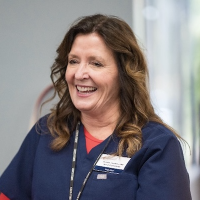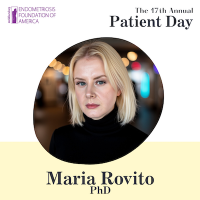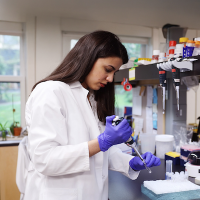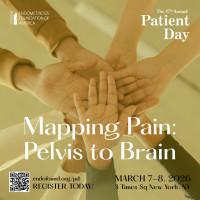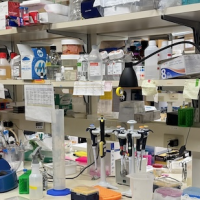
In his critically acclaimed book, The Doctor Will See You Now, EndoFound co-founder Dr. Tamer Seckin states: “A woman’s pain level plays no role in determining her stage. Someone with stage IV (severe) endometriosis may feel little or nothing at all, while someone with a stage I (mild) case could be seriously hurting.”
Lucy Metheny fell into the latter category.
“There’s a lot of suffering in my story that came in a different way,” she said.
Metheny, 21, will graduate this spring from the University of Texas at Austin with a degree in neuroscience before heading to medical school next year. Her endometriosis story began when she was a 17-year-old high school student in Dallas and got sick one morning at work.
“Looking back, I’d probably had endometriosis for a while, and that was my first endo flare-up,” Metheny said. “The flare-ups happened a lot more frequently after that.”
Metheny would develop heavy bleeding and cramping with her periods, which led her to visit her family’s gynecologist, the same one who delivered her and her sisters. Though endometriosis did not run in Metheny’s family, the gynecologist suggested Metheny might have it and said they’d monitor it.
“She put me on medication that lessens bleeding and helps cramping, but it made me nauseous and gave me a lot of trouble,” Metheny said. “She switched me to birth control, and that helped a lot. It took away everything bad that I was feeling.”
However, that feeling was short-lived.
About six months later, in the spring of 2022, Metheny began having severe headaches and was diagnosed with chronic migraines—more than 15 a month, each one lasting anywhere from four to 72 hours. Whether that had anything to do with endometriosis is unknown, but Metheny decided to go off birth control and take a medication specifically for migraines, which worked well. Even her periods didn’t bother her much during this time.
“I was fine. I was doing great. I got into the University of Texas, my dream school, and was starting that fall [in 2022],” she said.
Metheny had spent the prior year at a community college and would begin at UT as a sophomore. But about a month before school started, she went to the hospital with a fever and sore throat. She was tested for several possible causes and ultimately was diagnosed with latent tuberculosis. “Latent” means she had no symptoms of the disease, which doesn’t explain why she was sick (or why she was tested for tuberculosis, which is another story for another time). But now that she had this diagnosis, she had to undergo a year of antibiotic treatment. That led to several other complications.
“As soon as I started on the TB medication, I had a rash on my face, vomiting, joint pain, the flu, pneumonia. I was sick with a lot of things for a long time,” Metheny said. She still started at UT, though she spent part of the first semester on medical leave.
In the spring of 2023, her heavy periods returned. They worsened when her TB medication ended that summer and continued to wreak havoc on her life into 2024, to the extent that she was bleeding through a super tampon in 15 minutes.
“In February 2024, I ended up sitting in the bathtub one day because I was bleeding so much,” Metheny said. “I thought something crazy was happening, but I also wondered if maybe it was normal—I didn’t know. I went to the hospital and they didn’t find anything, so they sent me home. I saw my gynecologist a week after that, and she said, ‘This is not okay. We need to do surgery to see what’s going on.’”
The assumption was that endometriosis was the cause, but Metheny wanted to finish the semester before surgery. Those next few months were the most emotionally difficult months she’d encountered to date.
“I felt very isolated,” she said. “I knew with the surgery that they’d have no idea what they’d find, and if they found a lot [of endometriosis] and couldn’t get it all, I’d have to go into medically induced menopause. That was tough to process. I was 20 years old, wanted to go to medical school, and didn’t know if I’d be able to have kids. I did my best to get through the rest of that semester, but I did poorly because of the emotional weight. I don’t think the emotional component of endometriosis is talked about enough.”
Metheny had surgery last May, three days after her final exams. The doctor removed just one lesion near her colon. It was the only one she could find, but it was the cause of many of Metheny’s problems. Today, Metheny’s feeling the best she’s felt over the last four years. Her heavy bleeding and vomiting have stopped, and though she occasionally has migraines, they are controlled with medication.
As Metheny reflects on four years of countless symptoms from TB, migraines, and endometriosis, she said endometriosis has been and likely will continue to be the most challenging—but she’s doing her best to take it in stride.
“Endometriosis became the forefront of the culmination of all the diseases I’ve dealt with, and it’s the one that will probably be the most debilitating in my life emotionally,” Metheny said. “But I’m about to graduate with a degree that I never thought I’d attain, and I’m healthier than I’ve been in a long time. I don’t know if the endometriosis is going to return, but if it gets bad again, we’ll cross that bridge when we get there.”
Metheny is also determined to help others beat the disease. This past winter, she became a college ambassador for ENPOWR—EndoFound’s nationwide youth education initiative—by starting the Day by Day Run Club at UT. The all-women running/walking club meets monthly to distribute endometriosis literature to members and accept donations for EndoFound. It also gives women a safe place to talk about the disease, learn how to manage it, and get help.
“I think we’ve raised about $200 so far, which isn’t a lot, but I’m so grateful for it because those donating are college kids who don’t have a lot of money,” Metheny said. “The fact that they show up and might give five dollars, talk about women’s health, and have open conversations about periods—there’s really nothing here like it, and that means so much to me.”
Many women with endometriosis aren’t diagnosed for a decade or more because of a lack of education and awareness about the disease. Metheny knows how fortunate she was to be diagnosed when she was and wants to help others receive the same care.
“I think the moral of my story is that I had an incredible provider who saw the hell I was going through, understood it, and had the courage to say I needed surgery,” Metheny said. “When I woke up from surgery, she told me that my endo was Stage I but that my pain was still valid. She said her hope was that the surgery would take away some things and not add more. I’ll never forget that.”
*Patient stories submitted to EndoFound.org are the patient's views, not necessarily those of the foundation. All testimonials are from real patients, may not reflect the typical patient’s experience, and are not intended to represent or guarantee that anyone will achieve the same or similar results.





